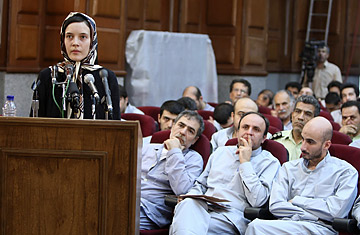
French-language teaching assistant Clotilde Reiss testifies during her trial at the revolutionary court in Tehran on Aug. 8, 2009
Will history one day point to a shy, soft-spoken French academic as the key to the return of Syria as a respected member of the international community? The next several days could provide an answer, as Damascus ups its efforts to help Paris gain the freedom of Clotilde Reiss, 24, an assistant teacher of French at Isfahan University, who has been detained in Iran since July 1 on charges of espionage.
Reiss was one of two French nationals — among several Europeans — arrested amid the street protests that rocked Iran following the disputed June re-election of Iranian President Mahmoud Ahmadinejad. After a month in Tehran's notorious Evin prison, Reiss was one of scores of demonstrators, reformers and bystanders who stood mass trial this month for allegedly inspiring the unrest and undermining the regime. On Aug. 16, Reiss was released on bail on the condition that she remain under house arrest at the French embassy until the announcement of the case's verdict. Last week, Franco-Iranian national Nazak Afshar, who worked in the French embassy in Tehran and was held on similar charges, was released to the embassy to await a verdict in her trial. In both cases French officials attributed the release of the women to intervention by what an official in Paris called "our Syrian friends."
President Nicolas Sarkozy, Foreign Affairs Ministry officials say, has repeatedly spoken by phone with his Syrian counterpart, President Bashar Assad, in recent weeks, requesting that Syria use all its influence with Tehran to free Afshar and Reiss. French officials now suspect Iran will mete out some symbolic legal ruling allowing the pair to return to France — perhaps before the start of Ramadan on Friday, Aug. 21. International media reports say a hastily organized visit by Assad to Iran has been planned for this week — presumably to secure Reiss and Afshar's freedom.
Why would the leader of a rogue state the U.S. still lists as a sponsor of terrorism want to play do-gooder for a Western power? In large part to repay Sarkozy for the French leader's decision to reach out to Assad in 2008 with an invitation to France's Bastille Day events. Late last year, Sarkozy renewed that embrace with a visit to Damascus, and in January he sought Assad's help in ending the fighting in Gaza.
Now it appears Syria is ready to return Sarkozy's favors. "Although the Americans have been slowly reaching out to Syria — especially since Barack Obama's election — Assad is aware Sarkozy was the first Western leader to truly see him as an ally and even a friend," says a French diplomat who asked not to be named. Sarkozy's trust, he adds, was especially appreciated by Damascus given the hatred former French President Jacques Chirac reserved for Assad — whom he blamed for the 2005 assassination of Lebanese Prime Minister and Chirac intimate Rafiq Hariri. "There's some genuine gratitude at work right now," the diplomat says.
Perhaps, but there's also a good deal of Syrian pragmatism in Damascus' actions — especially in seeking to normalize its position in the international community. Katerina Dalacoura, an international-relations lecturer at the London School of Economics, says that while Damascus is keen to end its pariah status once and for all, it still needs to balance a lot of conflicting regional relationships in doing so. "Syria's improved relations with France, as well as the U.S., is in many ways aimed at allowing it to operate more freely in the complex Middle Eastern system that requires having influential Western allies," Dalacoura says. "So it lowers its tone in Lebanon, sends signals to Israel via Turkey that it's willing to negotiate, and continues using its influence with Iran — all as a part of its increasing ties with the West. And this intervention in support of the French detainees is part of that."
What's more, Syria doesn't risk much going to bat for Paris now, since Iran is likely to spring Reiss and Afshar anyway. Tehran has used the women in the way it wanted to: as symbols of the supposed foreign planning behind the postelection protests. The bigger question is, Could Syria now be a useful interlocutor on the nuclear deal?
